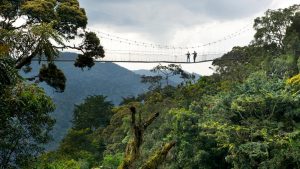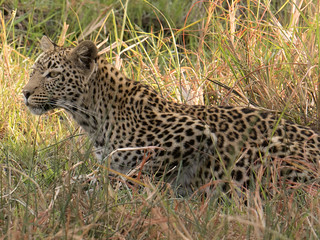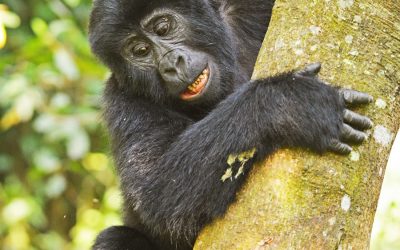Nyungwe Forest National Park, situated in southwestern Rwanda near the town of Cyangugu is a remarkable expanse of nature bordering Lake Kivu, Burundi and the Democratic Republic of Congo. Encompassing 970 square kilometers of land. This park has evolved from a forest reserve established in 1903 to a full-fledged national park in 2004, emphasizing its ecological significance.
The heart of the park, Nyungwe Forest is its most precious asset recognized as the largest remaining montane forest in Africa with a history tracing back to the Ice Age. This ancient forest is believed to be one of the sources of the great River Nile. The park’s terrain varies from mountainous and hilly to flat, contributing to its rich plant diversity.
Over 1,060 plant and tree species thrive here, showcasing a fascinating range of flora. The towering trees such as Carapa, Cyathea manniana, Newtonia and Prinaria excelsium reach heights of 1,900 meters above sea level. Higher up at 2,500 meters and above are species like Balthacaria, Hagenia Syzygium, Macaranga and Podocarpus flourish. The sub-alpine vegetation including shrubs and bamboo like Erica johnstoni and Phillipia thrive at altitudes of 2,950 meters. Mosses and ferns are widespread throughout the forest adding to the biodiversity.
The landscape
The park’s diverse landscape featuring mountains such as Mount Bigugu and its rich vegetation create a perfect habitat for a variety of wildlife and bird species. Nyungwe Forest National Park is home to 85 mammal species including 13 primate species. Notably, it harbors rare primates like the owl-faced monkeys, golden monkeys and the Angola Colobus Monkey which attract primate enthusiasts from around the world.
Due to its exceptional biodiversity, the Rwandan government in collaboration with various conservation organizations has invested substantial resources in promoting Nyungwe Forest National Park as a premier tourist destination. These efforts have significantly reduced poaching and raised awareness among local communities about the importance of preserving the forest’s unique ecosystems. This conservation focus has helped ensure the protection of the park’s flora and fauna. Making it a vital sanctuary for wildlife and a vibrant destination for eco-tourism.
Visitors to Nyungwe Forest National Park can experience its natural wonders through various activities including guided nature walks, bird watching and primate tracking. The park’s well-maintained trails and canopy walkways offer breathtaking views and close encounters with its diverse wildlife. Making it a must-visit destination for nature lovers and adventurers exploring Rwanda.
Wildlife in Nyungwe Forest National Park
 Nyungwe Forest National Park in Rwanda is a rich and diverse habitat with 75 mammal species. However, many are small and active at nightwhich makes them hard to spot. The main highlights are the chimpanzees which attract visitors with daily chimp trekking excursions. The park is also known for its large troops of Angolan Colobus monkeys which can often be seen moving through the trees adding to the park’s appeal.
Nyungwe Forest National Park in Rwanda is a rich and diverse habitat with 75 mammal species. However, many are small and active at nightwhich makes them hard to spot. The main highlights are the chimpanzees which attract visitors with daily chimp trekking excursions. The park is also known for its large troops of Angolan Colobus monkeys which can often be seen moving through the trees adding to the park’s appeal.
Nyungwe Forest National Park, a lush montane forest in Rwanda is renowned for its large primate population which constitutes 20-25% of all primates in Africa. The 13 primate species found in the park include Chimpanzees, Silver monkeys, Golden monkeys, Owl-faced monkeys (Hamlyn’s monkey), Grey-cheeked mangabey, Red-tailed monkeys, L’Hoest’s monkeys, Vervet monkeys, Olive baboons, Dent’s Mona monkey, blue monkey and Angolan Colobus monkeys.
However, Angolan Colobus monkey and Chimpanzees stand out as the primary attractions for tourists. While these two species are currently the only ones fully habituated for visitor interactions, ongoing efforts are in place to habituate other species such as the Grey-cheeked mangabeys to enhance the park’s appeal. The presence of these primates adds a unique and captivating dimension to the scenic beauty of Nyungwe making it a remarkable destination for wildlife enthusiasts.
Bird species in Nyungwe Forest
 In addition to its primate diversity, Nyungwe Forest is a birdwatcher’s paradise with around 300 bird species including 16 that are endemic, 27 from the Albertine Rift and 121 forest species. Some notable birds include the Chestnut Owlet, Olive and Elliot’s Woodpeckers, Great Blue and Ruwenzori Turacos and the striking, Red-collared Babbler. The park also hosts the remarkable Archer’s Robin Chat, White-bellied Robin Chat and various sunbirds and warblers making it a vibrant destination for bird enthusiasts.
In addition to its primate diversity, Nyungwe Forest is a birdwatcher’s paradise with around 300 bird species including 16 that are endemic, 27 from the Albertine Rift and 121 forest species. Some notable birds include the Chestnut Owlet, Olive and Elliot’s Woodpeckers, Great Blue and Ruwenzori Turacos and the striking, Red-collared Babbler. The park also hosts the remarkable Archer’s Robin Chat, White-bellied Robin Chat and various sunbirds and warblers making it a vibrant destination for bird enthusiasts.
Activities in Nyungwe Forest National Park
Nyungwe Forest National Park located in Rwanda offers a variety of exciting activities for visitors ranging from wildlife tracking to cultural experiences. Here’s a look at what you can enjoy during your visit.
Chimpanzee Trekking
Nyungwe Forest is home to two main chimpanzee communities that are habituated for tourism. One group resides in the Cyamudongo section and the other is around the Uwinka area. With about 400 chimpanzees living in the forest, chimpanzee trekking is a highlight of a visit here. To increase your chances of seeing these fascinating primates, it’s best to start early. Visitors are expected to arrive at the briefing area by 6:00 am. This early start is necessary because chimpanzees are most active in the morning and tracking them requires a bit of effort. Even if you don’t see the chimps, you can still enjoy the forest’s beauty including other primates, butterflies and the fresh forest air.
Birdwatching
Birdwatchers will find Nyungwe Forest a paradise with its rich birdlife. The park sits at high altitudes between 1,600 and 2,950 meters providing a unique environment for numerous bird species. Birds are often found in trees, shrubs or along the edges of the forest near tea plantations. Some of the notable birds you might spot include the Rwenzori Nightjar, White-tailed Crested Flycatcher and the Handsome Francolin. With well-maintained trails and experienced bird guides available, birdwatching in Nyungwe is an enjoyable and rewarding experience.
Nature and Hiking Walks
Nyungwe Forest features a steep landscape and an extensive network of hiking trails suitable for various fitness levels and interests. Here are some of the trails you can explore:
- Congo-Nile Divide Trail: This 227 km trail is for experienced hikers and can take several days to complete. You can also opt for a one-day hike to enjoy diverse landscapes and communities. Campsites are available, but you’ll need to bring your own camping gear.
- Igishigishigi Trail: This 2 km trail offers beautiful views of the forest canopy, wildflowers, and occasional monkeys. It takes about one to two hours to hike and is suitable for all ages, though children must be accompanied by adults.
- Karamba Trail: Known for birdwatching, this trail features fern trees and was once a gold mine site.
- Umugote Trail: Ideal for seeing primates and birds, this trail also offers views of ridges and butterflies. On clear days, you might see Kibira National Park in Burundi.
- Umoyove Trail: Also called the Mahogany Trail, it leads to a waterfall where you can relax and enjoy views of tall trees.
- Uwinka Trail: A more challenging hike, this trail is excellent for birdwatching.
- Irebero Trail: Offers views of Lake Kivu and two of the highest peaks in Nyungwe.
- Imbaraga Trail: A 10 km trail for experienced hikers featuring waterfalls.
- Bigugu Trail: This trail takes you to the highest peak in Nyungwe and offers views of Lake Kivu and the DR Congo.
- Isumo Trail: Experience tea fields and see the park’s largest waterfall. You can even participate in tea picking and learn about the tea-making process.
- Kamiranzovu Trail: Close to waterfalls, wetlands, and swamps.
- Muzimu Trail: Passes through eucalyptus and pine forests.
- Ngabwe Trail: Leads to a pleasant picnic and camping site.
- Rukuzi Trail: Ideal for spotting chimpanzees and viewing nearby villages.
Canopy Walk
 The canopy walk is a unique experience along the Igishigishigi Trail. The walkway hanging 60 meters above the forest floor offers spectacular views of the park from between giant trees and towers. This guided tour allows you to see Nyungwe Forest from a new perspective.
The canopy walk is a unique experience along the Igishigishigi Trail. The walkway hanging 60 meters above the forest floor offers spectacular views of the park from between giant trees and towers. This guided tour allows you to see Nyungwe Forest from a new perspective.
Cultural Tours
To round off your visit, consider exploring the local communities around Nyungwe Forest. These communities have lived in harmony with the forest and play a role in its conservation. Cultural tours offer a chance to experience traditional Rwandan life, including dance ceremonies, banana beer production and traditional medicine making. Engaging with the local culture enriches your visit and supports community-based conservation efforts.
Nyungwe Forest National Park provides a range of activities that cater to different interests from wildlife tracking and birdwatching to hiking and cultural immersion making it a memorable destination for all visitors.
Best Time to Go to Nyungwe Forest National Park
For a great experience at Nyungwe Forest National Park, the best time to visit is during the dry seasons: June to September and December to February. During these months, the weather is warmer and there is less rain making it easier to explore the forest for activities like chimpanzee trekking, canopy walks, birdwatching, and monkey tracking.
Keep in mind that these popular months can be busier with more visitors. If you prefer fewer crowds, you can visit from March to May or October to November. However, be prepared for more rain and cooler temperatures during these times.
How to Get to Nyungwe National Park
There are two main ways to reach Nyungwe Forest National Park. The quickest and most convenient option is to take a 45-minute helicopter flight from Kigali City which can land directly at some safari lodges. These flights are provided by Akagera Aviation and offer a stunning aerial view of the landscape. Upon arrival, a representative will meet you at the helipad and escort you to your accommodation.
For those traveling on a budget, a self-drive or chauffeur-driven safari vehicle is a viable option. The drive from Kigali to Nyungwe takes about 6-7 hours, covering approximately 226 kilometers. The well-maintained road offers scenic views with opportunities for stopovers at attractions like the Royal Palace Museum in Nyanza and the Ethnographic Museum in Butare.
Alternatively, you can use public transport such as a bus or taxi from Nyabugogo Park in Kigali to Rusizi. This option involves multiple stops and can take 7-8 hours. Although less direct, it is a more economical choice for reaching Nyungwe Forest.
Top Rwanda Safari Packages
This 9 days Rwanda gorilla tour includes stops at Volcanoes National Park, Akagera for a Big 5 safari, and Nyungwe or Kyamudongo forest for chimpanzee tracking. Beginning with a city tour of Kigali, the trip continues with birding and primate tracking in Nyungwe Forest National Park
| Trip details |
| Contact Us |
Experience the ultimate combination of two worlds on this 7-day gorilla tracking tour to Volcanoes National Park, where you’ll get up close and personal with gorillas; Akagera National Park, where you’ll go on thrilling game drives; and Nyungwe Forest
| Trip details |
| Contact Us |
The 3 days Rwanda gorilla Tour takes you through the Kigali, for the city tour to Volcanoes national park where you will have a lifetime experience, visiting the mountain gorillas and live you with a memorable experience from the unforgettable photos and videos you will take, a visit to the twin Lakes (Burera and Ruhondo)
| Trip details |
| Contact Us |



